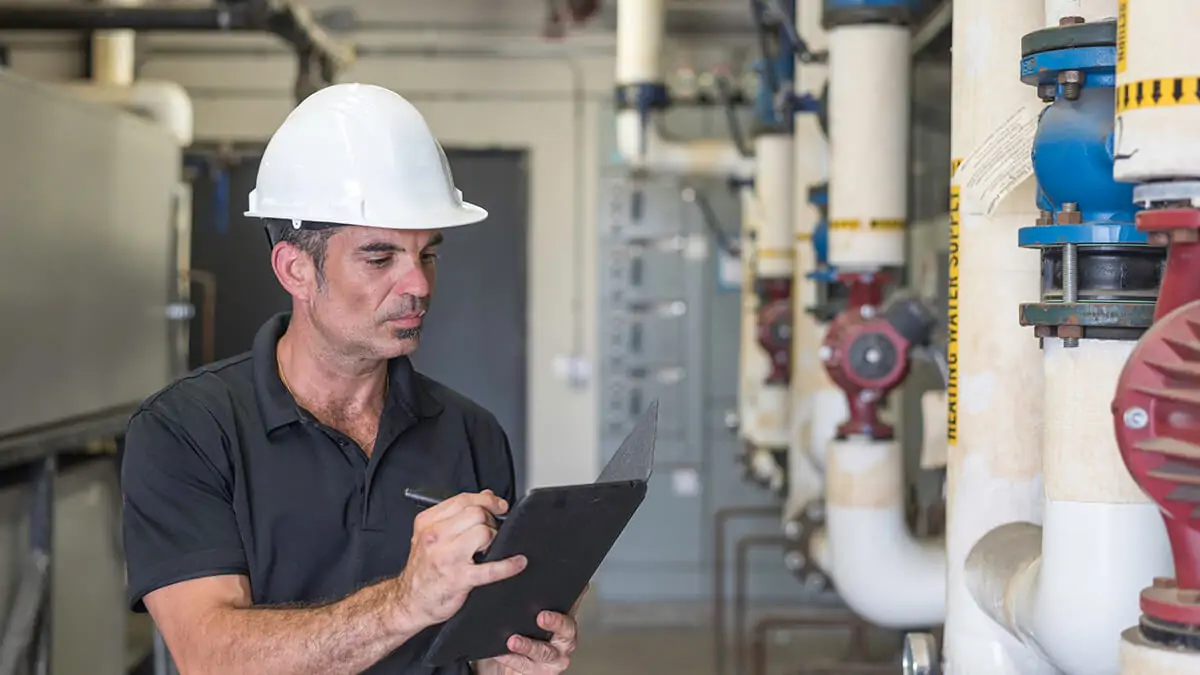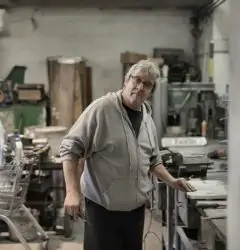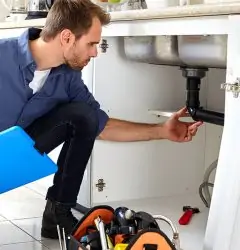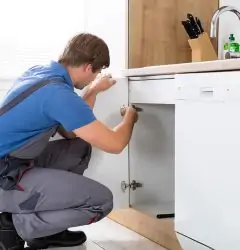14 Sep

HVAC is an abbreviation for heating, ventilation, and air conditioning. HVAC preventative maintenance keeps the HVAC system in good condition.
The system exists to provide necessary cooling and heating to commercial and residential buildings. An HVAC system can be found anywhere from submarines to single-family houses where comfort is necessary for life. Heating, Ventilation, and Air Conditioning systems are becoming greatly popular in new construction as these systems utilize fresh air from the outside and deliver good quality indoor air.
Moreover, the ‘V’ is for ventilation that refers to the process of exchanging or replacing air that is present within a space. It helps to maintain high-quality air while indoors along with moisture removal. Aside from that, it also removes dust, odors, heat, carbon dioxide, bacteria, smoke, and other harmful gases within a space. HVAC systems allow for oxygen replenishment and temperature control.
What Is HVAC Equipment?
This system is not only meant to just cooling and warming a space. But it is made for improving the quality of the air we breathe in. HVAC systems have proved themselves in offering comfort to people in their everyday lives for a long time now. However, there are various types of HVAC systems, but the basics are the same in each of them.
First and foremost is a source that utilizes the air from outdoors and from within a space. It is called ventilation, and it occurs in two ways. Natural ventilation exists in homes, and it refers to the process where air moves out and moves in via vents, doors, windows, or any other opening. This exchange is typically necessary to replenish oxygen and eliminate certain gases such as carbon dioxide, odors, and unnecessary moisture.
At the same time, mechanical ventilation requires a mechanical system for moving the air in and out of space. Previously, natural ventilation existed in most homes from cracks and gaps in the construction as well as with opening and closing of windows and doors. However, in the present age, houses are tightly sealed. New construction requires mechanical ventilation, and that is why ventilation has become a necessary component of HVAC systems.
Once the air comes in, it is taken to the air handling unit. In this unit, the air is filtered, and any type of dirt, odors, allergens, dust, and other particles are removed from it. The air is then sent to be cooled or to be heated. And after it is clean and its temperature is according to the requirement, it is sent into the house.
For the central system, it means the air is going to be moved via a duct network and will be sent into different rooms. For other types of systems, it just means that the air will be sent into space.
What Does HVAC System Do?
The main three functions of the HVAC system are connected—especially when delivering thermal comfort and high quality of indoor air. The air conditioning and heating system are usually one of the most complex and large systems in any house. But if it breaks down due to any issue, you will know it right away!
There are nine parts of an HVAC system, and these include blower, coils, compressor, outdoor unit, electrical elements, ducts, outlets, exhaust, filter, and air return.
What Is HVAC Preventative Maintenance?
The aim of preventative maintenance is keeping the HVAC system in good working condition and running it throughout the season with no unexpected failures and breakdowns. Through preventative maintenance, homeowners are enabled to maintain the temperature of their house according to their comfort with efficient and reliable service while the system is operating efficiently.
How Often Should HVAC Be Serviced?
Every year when the season changes, every homeowner must get their HVAC system serviced to avoid mid-season HVAC system failure. According to most manufacturers of HVAC systems, you must get both the cooling and heating portion of your system serviced at least once a year. It is considered as a good practice for keeping your system from breaking down suddenly in extreme weather conditions. Get your air conditioning system services in the spring season, whereas in fall, get the heating system serviced.
Does HVAC Require Annual Maintenance?
If you ask any expert, their answer will be ‘yes.’ Once a year, you should get your HVAC system serviced. It is better not to wait for it to breakdown completely. Make sure you get your air condition system services in the spring and heating system in fall. This way, your system will be running efficiently throughout the year.
Commercial HVAC Preventative Maintenance Checklist
Maintenance departments and facility managers can maintain their HVAC systems and keeping them running smoothly without any issues. It can be done through regular commercial HVAC maintenance. You can use the below-mentioned checklist for HVAC maintenance as your guide.
Preventative Commercial HVAC Maintenance
A preventative maintenance checklist for commercial buildings usually include the following:
- Name of customer, building, and unit number.
- Location of equipment that is being maintained.
- Date of maintenance.
- Name of the technician.
- Filter inspection.
- Cleaning evaporation coils and condenser.
- Checking the levels of refrigerant.
- Inspecting and cleaning pans and drain lines.
- Inspecting and tightening electrical connections and wiring.
- Checking pulleys, belts, fan motor, and cleaning the blower.
- Checking and programming thermostats.
- Inspecting the compressor and checking the levels of oil.
- Inspecting the heat exchanger.
- Checking and adjusting ignition and burner assembly.
- Adding comments.
Humidifier Maintenance Checklist
Changing The Water Panel
The water panel is the same as an air filter. It contains media that is centrally placed in the flowing air’s path. Instead of capturing pollutants, these panels slowly receive moisture that is mixed in with the air that is blown from the HVAC system. All the contents in this panel are clogged with time because of impurities in the water.
In residential buildings with hard water, i.e., water with most mineral content, these panels will require replacement from time to time. It is better not to leave it clogged and wet in the humidifier to minimize the growth of bacteria.
Cleaning The Water Reservoir
Water reservoir is a small tank that stores and regulates the water that is provided to the water panel. It requires an inspection to make sure that it does not have lime scale or any other types of deposits, which will lead to clogging.
It requires cleaning periodically to ensure it does not become a place for the growth of microorganisms that will enter the ventilation system, and your space’s air quality is not compromised. If the water reservoir is clogged already, you should get it serviced by a company.
Calling Local HVAC Company
If you think you cannot solve the problem on your own, you can call a local HVAC company to get it repaired. Yearly inspections of your HVAC system is necessary to keep it working properly. Ideally, the HVAC system that features both cooling and heating along with humidification and ventilation system, you must not wait for any unexpected failure.
HVAC Spring & Summer Annual Maintenance
When getting your HVAC system serviced, you must ensure do perform these maintenance tasks to prepare your system for the coming season.
- Cleaning or repairing filters.
- Cleaning evaporator coils and condenser.
- Cleaning drain lines and cleaning clogs for proper flow.
- Cleaning drain pans.
- Replacing belts and worn pulleys.
- Inspecting the ducts for debris, dust, and mold.
- Observing levels of humidity.
- Checking refrigerant
- Testing thermostats and all controls to make sure timer functions and temperatures are set correctly.
- Changing batteries.
- Checking all connections and systems.
- Checking the fan motor.
- Inspecting blades and blowers for proper airflow.
- Lubricating parts of motors.
- Inspecting cabinet for any leaks and checking cabinet doors.
- Checking the outside unit for debris.
Annual AC Maintenance Checklist
The annual maintenance of the HVAC system must involve the following preventative maintenance tasks
- Cleaning the indoor evaporator units and outdoor condenser coils.
- Checking the level of refrigerant.
- Inspecting the pans of drains and condensate drains.
- Checking motor fan and blades.
- Checking indoor blower assembly.
- Inspecting refrigerant tubing and compressor.
- Lubricating movable parts.
- Inspecting electrical connections, wiring, controls.
- Inspecting and cleaning filters or replacing them.
- Running a system test.
- Checking ductwork for any leaks or other problems.
Central Air Conditioner Maintenance Checklist
Have a look at this useful ac inspection checklist:
- Inspecting the blower motor.
- Inspecting the thermostat.
- Cleaning filters.
- Inspecting bearings.
- Checking indoor coil
- Condensate drain.
- Inspecting oil of condenser.
- Inspecting refrigerant.
- Checking safety devices.
- Inspecting electrical wiring and connections.
- Testing and inspecting capacitors.
- Inspecting fan blade.
- Cleaning coils and removing debris.
- Checking compressors and service valves.
Chiller Maintenance Checklist
- Inspecting water outlet and inlet for leaks.
- Cleaning the sump and inspecting for corrosion.
- Inspecting cooling coils and cleaning the surfaces.
- Checking for leaks, bent fins, or corrosion.
- Inspecting and cleaning the zone control actuators.
- Checking the compressors, refrigerant charge, crankcase, vibration, oil levels, heater, and temperatures of operation.
- Cleaning the condenser fans, bearings, and lubricating them according to the requirement.
- Checking couplings and belts.
- Inspecting coil of the condenser for leaks and corrosion.
- Inspecting the electrical disconnect.
- Checking and cleaning the filter dryer.
- Inspecting the fresh air damper.
Fall & Winter HVAC Maintenance Tasks
- Replacing filters that are present on the heating equipment.
- Inspecting ignition burner assembly.
- Examining heating elements or heat exchanger.
- Inspecting for any leaks.
- Assessing pressure of the gas.
- Checking belts and pulleys.
- Clearing drain pans and drain lines.
- Checking all electrical connections.
- Lubricating bearings, motors, and other moveable parts.
- Checking controls and thermostats.
- Checking blower and fan operation.
- Inspecting the heat pump.
- Examining vents and ductwork.
Heating Maintenance Checklist
- Inspecting the filter and replacing it when required.
- Inspecting thermostat and repairing or replacing it if needed.
- Inspection of furnace and boiler and repairing or replacing it according to the need.
- Checking the fuel line and fuel tank.
- Inspection of radiation and ventilation.
- Inspecting the duct and replacing it if needed.
- Central heating system maintenance.
- HVAC System Annual Maintenance.
Boiler PM Checklist
- HVAC preventative maintenance also includes Boiler PM Maintenance Checklist. The following maintenance tasks must be performed:
- Inspecting and cleaning fireside surfaces.
- Inspecting utility hole in gaskets for any leaks.
- Checking all material of burner refractory.
- Inspecting and testing all valves of systems.
- Cleaning and rebuilding low water cut-off.
- Recalibrating the controls for operation.
- Cleaning condensate receiver.
- Inspecting all electrical terminals.
- Checking levels of fuel oil.
- Cleaning and inspecting chimneys.
- Inspecting and cleaning boiler and its components.
Gas Boiler Maintenance Checklist
- Inspecting the area around the boiler for any leaks.
- Making sure the area surrounding the boiler does not have any material that can lead to obstruction.
- Checking the pressure and/or temperature readings.
- Inspecting for ay service or error codes in the display panel.
- Making sure the vent termination is not blocked obstructed with snow, ice, or debris.
- Inspecting the combustion air opening for any blockages.
- Checking for any unusual and weird sounds coming from the equipment.
Annual Furnace Preventative Maintenance Checklist
- Cleaning vents and chimneys.
- Changing air filters of the furnace.
- Inspecting and lubricating all parts.
- Inspecting electrical connections.
- Testing smoke detectors and carbon monoxide.
- Updating maintenance records.
Gas Furnace Inspection Checklist
- Inspecting the heat exchanger for signs of deterioration or cracks.
- Cleaning the burners.
- Checking and adjusting the switch of the fan.
- Cleaning and adjusting the pilot and its assembly.
- Inspecting all safety controls.
- Inspecting the gas line.
- Checking the opening of combustion air.
- Inspecting the flue pipe.
- Recording performance and temperature.
- Securing all panels.
- Testing and inspecting safeties and controls.
Heat Pump Maintenance Checklist
- Inspecting the ducts, blowers, indoor coil, and filters for damage, dirt, or obstructions.
- Cleaning the drain pan and indoor coil.
- Cleaning and flushing the drain line.
- Identifying and sealing any leaks found in ducts.
- Checking the line and discharge pressure of the system.
- Measuring and verifying the refrigerant charge.
- Inspecting all electrical wiring and connection.
- Checking the blower wheel for cleanliness and balance.
- Testing operation of the thermostat.
- Inspecting the belts for wear and tightness.
HVAC Inspection Checklist Residential
Before you make ac maintenance plans for the coming season, have a look at this HVAC preventative maintenance checklist for residential building:
- Air filter
- Auxiliary heat operation
- Blower components
- Burner assembly
- Combustion air
- Condensate drains
- Condenser
- Correct airflow
- Defrost cycle
- Electrical connections
- Equipment condition
- Equipment match
- Evaporator coils
- Gas piping
- Gas pressure
- Heat exchanger
- Proper system operation
- Equipment area
- Equipment clearances
- Heat mode
- Evaporator coils
- Gas piping
- Gas pressure
- Installation quality
- Refrigerant pressure
- Safety controls
- Starting capabilities
- Heat exchanger
- Heat mode
- Ignition assembly
- Temperature differentiation
- Thermostat calibration
- Vent clearances
- Venting
Home Ac Maintenance Checklist
- Condenser Coil
- Refrigerant Charge
- Controls and Safeties
- Relays and Contactors
- Crankcase Heater
- Unit Wiring
- Temperature and Pressures
- Capacitors
- Unit Disconnect
- Lubrication
- Belts and Pulleys
- Condensate Drain
- Air Filter
- Voltage and Amp
- Thermostat
- Motors
Why HVAC Preventive Maintenance Is Important?
Less Consumption of Energy
A well-maintained HVAC system works smoothly and efficiently, and hence it consumes less energy. You will save more on your energy bills. If you avoid maintaining your HVAC system, you will have to spend more than just a few dollars to fix the issues that will arrive because of your negligence.
No Costly repairs
Preventative maintenance helps to keep your HVAC system in good operating condition, and you will know about the issues occurring in your system from time to time through regular inspection. You can perform maintenance tasks or contact a local HVAC company to get your system repaired and fixed. Keeping your system under check will help you to avoid costly repairs all of a sudden. Fixing small problems on time is better than spending a lot if your system breaks down.
Improved Air Quality
If your HVAC system is working properly, the quality of air in your home will be good. You do not have to worry about the air you and your family breathe in as the air will be dust and pollutants free. Moreover, no harmful gases will be able to sneak in.
Safer Home For Your Family
You want your home to be safer for yourself and your family, and thus, an HVAC system in good working conditions is necessary. Preventative maintenance will enable you to remove any existence of carbon monoxide from your house so that your family’s health is never compromised.
Extended System Life
Regular preventative maintenance will lead to a longer life span of your HVAC system. You will have fewer issues appearing out of nowhere. Also, you can be sure that the air quality in your house is ideal.
Air Conditioning Systems Maintenance Tips
Are you looking for some useful HVAC maintenance tips? Here are some for maintaining your Air Conditioning Systems:
- Be sure to examine the thermostat.
- Replace or clean the air filters when required.
- Ensure the outside unit is cleaned.
- Inspect all connections, components, and electrical wiring.
- Check the Condenser fan.
- Get your HVAC system inspected by a professional.
HVAC Preventive Maintenance Software
Here are some benefits of using an HVAC preventative Maintenance System:
Track Your Assets And Parts
Using HVAC software allows you to keep track of all your equipment, vehicle, assets, along with other inventory.
Preventative Maintenance
The software enables you to be notified whenever your systems require maintenance. You get the alerts via email as well as on-screen.
Repair Maintenance
HVAC software makes it easier for you to manage unexpected failures and breakdowns that require repair efficiently.
Record Keeping
Keeping a record of all your maintenance history allows you to minimize the downtime and offer you valuable statistics when making a decision.
Customize Your Experience
Using software allows you to have access to more than 100 built-in reports with a wide option of customizing your experience.




Ecodocs